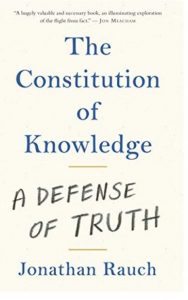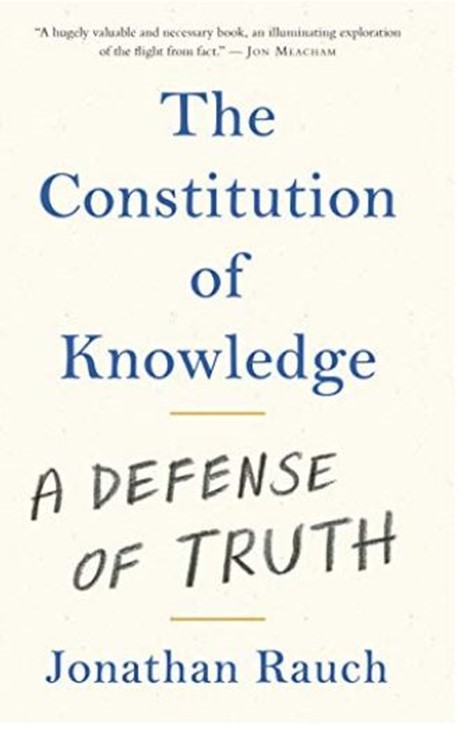By Jim Heffernan
I thoroughly enjoyed this book. I was attracted to it by its “A Defense of Truth” in the book title. Truth seems to be something that is in short supply these days. This is a book with big ideas, big words (Epistemology and epistemic are terms he uses often-they’re words that refer to our body of knowledge), and marvelous organization. Even with the difficult language this is a book I will read twice. Starting today.
At first I thought it must have been another book written by a philosophy teacher, but Jonathan Rauch is a journalist. He does use a lot of the words used by philosophers. A recurring theme is a dialogue between Socrates and a student, Theaetetus (Thay-tee-tus) seeking to answer the question of what is knowledge. What they come up with is, “Acquiring knowledge is a conversation, not a destination. It is a process, a journey–we take together, not alone. Others are always involved. Knowledge is not just something I have; more fundamentally, it is something we have.”
I find the constitution comparison fascinating. Our Federal Constitution has defined our system of laws and government, not because everything was written down to begin with, but because a mechanism, our wonderful “checks and balances”, was put into the Constitution that allows us to continually question our system and to allow for our systems continual evolution.
So too, the “constitution of knowledge” thrives by the continual questioning and testing. The “constitution of knowledge” uses the scientific method and has led to a collection of knowledge that powers our modern world.
There are forces that chip away at the “constitution of knowledge” that really scare me. Rauch seems to recognize them quite well and offers us a way to preserve and enhance our “constitution of knowledge”.
I don’t think I have ever read a book whose Table of Contents summarized the flow of the book so well. I include it here to close out.
 1. “A Terrible Statement Unless He Gets Away with It”
1. “A Terrible Statement Unless He Gets Away with It”
Chaos and conformity have caused an epistemic crisis
2. The State of Nature: Tribal Truth
Bias, groupthink, and the epistemic war of all against all
3. Booting Reality: The Rise of Networked Knowledge
Outsourcing reality to a social network is humankind’s greatest innovation
4. The Constitution of Knowledge
The operating system of the reality-based community
5. Disinformation Technology: The Challenge of Digital Media
Making the online world truth-friendly is difficult but doable
6. Troll Epistemology: “Flood the Zone with Shit”
Disinformation is an old enemy with new weapons and powerful friends
7. Canceling: Despotism of the Few
Coercive conformity is corrupting the reality-based community
8. Unmute Yourself: Pushing Back
Defending the Constitution of Knowledge requires confidence and counter-mobilization
384 Pages (58 pages acknowledgements, notes, and index); Published 6-2021; Available at library (print and e-book), Amazon, Powell’s


.png)